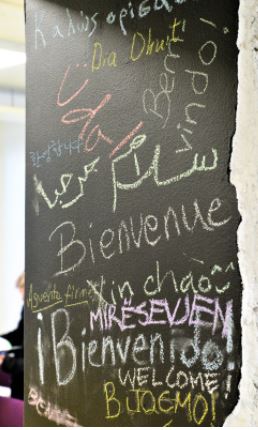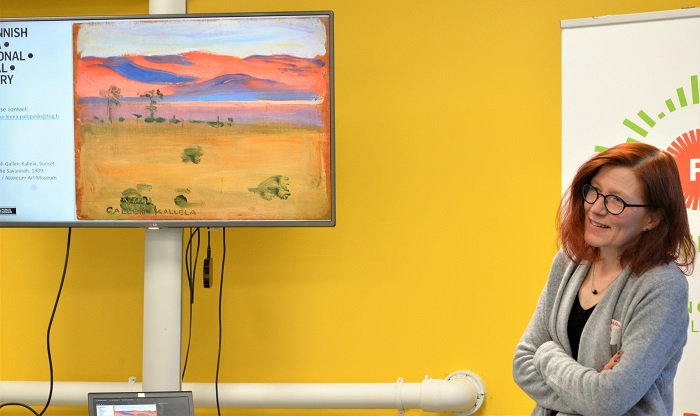Open data is a solid base for new business

The Open Data Day on 3/3/2018 was celebrated in Helsinki by presenting the best open data business cases and new data sets. The world’s first Mobility as a Service application Whim, connecting various modes of transport to fixed price monthly packages, started its worldwide conquest from Helsinki.
The Open Data Day kick-off event, organized by Helsinki Region Infoshare and Open Knowledge Finland, brought together a number of people interested in open data reserves in the Helsinki Region. The HRI open data service was launched seven years ago, local cities seeking better use of their own public data. “Open data is raw material for new digital services,” says Tanja Lahti, HRI Project Manager.
Today the HRI service provides 630 data sets, over 100 APIs, and a total of 200 showcase applications utilizing HRI data. One of the success stories is the Blindsquare mobile app, helping visually impaired to navigate in urban environments. “It is in use in more than 150 countries,” says Teemu Ropponen of Open Knowledge Finland.
And new open data success stories are on the way. MaaS Global’s Whim application, the winner of European Startup Prize for Mobility award, was first launched in the Helsinki Region. It is the world’s first Mobility as a Service (MaaS) application, offering fixed-price mobility packages. It is developed by MaaS Global, a Finnish start-up company. In 2017, company raised €14.2 million in investments. The Whim Unlimited monthly plan gives unlimited access to public transport, taxi or rental car according to the user’s needs. The Whim mobile app plans the journey to desired destination, buys travel tickets, orders taxi and books a rental car.

“The cost of a private car is over € 500 per month, and owning a car is a burden to many people. We want to create a better alternative to car ownership, “says Jonna Pöllänen, MaaS Global Collaboration Manager. The Whim service utilizes one of the HRI’s most popular APIs, the Route Planner API provided by Helsinki Region transport operator HSL. HSL will also open the HSL Sales API, an open service package for MaaS operators.
Another interesting new data set is the Helsinki Energy and Climate Atlas, published as a part of the Helsinki 3D City Model. Its data content is a treasure trove for example for companies selling energy efficiency improvements. The Atlas tells you, for example, the amount of solar energy to each roof in Helsinki and the calculated energy consumption of buildings. “This is a tool that will help us to reach our climate targets, to make Helsinki carbon neutral by 2035,” says Environmental Planner Petteri Huuska of the City of Helsinki Environment Services.
Presentations
- Tanja Lahti: Open Data and actions in Helsinki Region
- Teemu Ropponen: Open Data Day 2018
- Tia Hallanoro: MyHelsinki: helping people find the best of Helsinki
- Jonna Pöllänen: Whim Mobility as a service – The End of Car Ownership?
- Petteri Huuska: Helsinki’s energy Data into 3D City Model
- Jyrki Koskinen: DOB data-driven business
- Hanna-Leena Paloposki: Finnish National Gallery and Open Data
Open data has also been harnessed for Helsinki marketing. MyHelsinki.fi provides tourists with information and local residents’ recommendations about Helsinki’s restaurants, attractions and events. Soon MyHelsinki content will be accessed via open APIs, says Marketing Communications Director Tia Hallanoro of Helsinki Marketing. “Open data is our content marketing,” Hallanoro says. For example, China’s favourite instant messaging service WeChat has built up a WeChat Helsinki Mini Program for Asian travelers, utilizing the content of the MyHelsinki database.
The DOB – Data Driven Business program encouraged companies to utilize data analytics and service design to create new services, said Jyrki Koskinen. The best practices of the project have been published in the Toolbox. The project will continue in open DOBit network.
The new Helsinki City Strategy sets the goal to make Helsinki the most functional city in the world. “Open data is one of the key elements when making this a reality,” says HRI’s Tanja Lahti.

There was a short workshop about the challenges to be solved with open data and what kind of support open data users need. The results of the workshop:
1) Challenges to be solved or services to be improved with open data?
- enriching/submitting metadata by crowdsourcing -> more cultural heritage
- improving the experience of tourists by utilizing the archive data (e.g. from National Archive)
- data should be more accurate (more accurate location data needed)
- we see same kind of apps again and again
- gamifigation with archive open data etc. but critical mass needed!
- mobility apps are the most viable open data use cases
- timing, peak times of service use, behavioral data
- “Missä Toven teokset näytillä” -app, data vielä uupuu!
- welfare renovation -> how to empower people take care of themselves (health)
- machine learning use analysing art -> adding metadata
- flunssa epidemia
- Tampere tautikartta
- kansalaisen älykaupunki, mikä kiinnostaa kaupunkilaisia
2) Which kind of support do you need to implement ideas (mentioned or other)?
- marketing the open data based use cases e.g. creating/sharing videos, do marketing more professional way
- power of simulation by gamification, visualisation
- cocreation in multi-talent teams
- could be created or completed within community?
- GDPR & secondary usage of data
- more brainstorming before hackathons
- civil servants would need to learn how to include geolocation data into open data
- getting anonymised data from quantified self services
- use cases
- data analysts involved in hackathons or projects otherwise
- hyödyntäjäyhteisö kertomaan, mitä dataa käytetään
- MyHelsinki <-> FNG
- support decision-makers to learn to think (what is open data?)
- prototyping is easy to do but data is missing often
- museoyhteisö

Leave a Reply